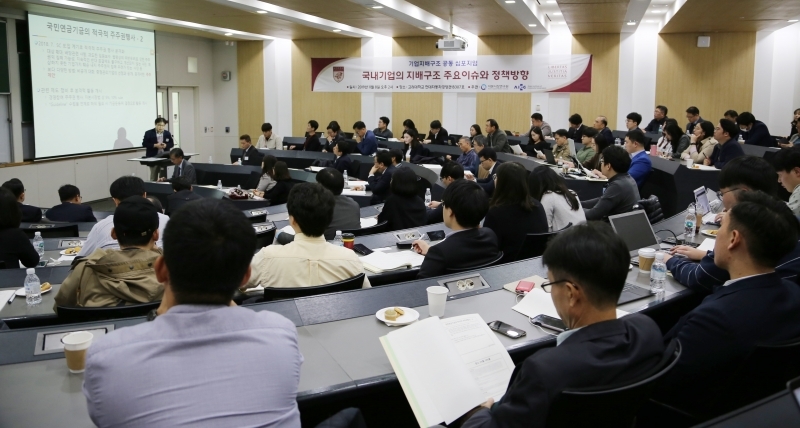News
KUBS News

The AICG-KCMI Joint Symposium on ‘Governance Issues and Policies of Domestic Companies’ was held at the Hyundai Motor Hall on November 8th. The event was co-hosted by the Asian Institute of Corporate Governance (AICG) and the Korea Capital Market Institute (KCMI). Attending the event were Park Chang-kyun (KCMI), Kim Woochan (KUBS), Kim Woojin (SNU), Na Hyun Seung (KUBS), Park Yoo-kyoung (APG), Ahn Soo-hyun (HUFS), Lee Si-yeon (KIF) and Lee Chang-min (Hanyang Univ).
The event began with an opening speech by Park Kyung Suh, Director of the AICG. "AICG has tried to solve a number of finance and governance-related problems that Korean companies have faced," said Park. "I hope that valuable discussions will continue throughout the joint symposium today."
It was followed by a welcoming speech by Park Young-seok, Head of the KCMI. "Since the financial crisis, there has been a social consensus that the chaebol-oriented economic system is no longer valid," Park said. "It is true that the institutional establishments to enhance corporate value have been pursued ever since. Despite that, we still have a weak corporate governance which brings the so-called Korea Discount phenomenon," he said. "I hope we can take full advantage of our researchers' capabilities at the joint symposium today to have various discussions."
Then the event was followed by a congratulatory speech by Cho Sung-wook, Chairman of the Fair Trade Commission. Since the Chairman herself was absent, Kim Sung-sam, a member of FTC, delivered a congratulatory speech instead. “Today’s meeting is where we discuss a number of recent issues related to corporate governance in Korea,” said Kim, adding that although many improvements have been made, the nation’s corporate governance is still lagging behind. "Improving corporate governance is a must-have task to ensure the rationality of corporate management and prevent problems that hinder fair competition," he said. "Based on today's discussions, FTC will also make continuous efforts to achieve this."
Park Chang-kyun, a senior researcher at KCMI, first gave a presentation under the theme of "Shareholder Activism and Corporate Governance of NPS." Park explained why people oppose NPS’s shareholder activism, including the concerns about “pension socialism” and its effectiveness, and conducted a critical analysis. "There needs to be a mechanism to exclude government intervention," said Park, suggesting that the fund management committee should be reorganized into a professional organization to establish a system that operates in the form of a sub-committee.
Professor Kim Woochan from KUBS then gave a presentation under the theme of "Is It Necessary to Defend Management Rights? Dual Class Shares and Poison Pill." "The threats to management rights can be made by either hostile takeover or proxy fights, but they often end up being rarely used," Professor Kim said. "The reason why there is no threat to management rights is due to following reasons: the ownership structure in Korea, various means of protecting management rights and difficulties in making public purchases or proxy fights. Nevertheless, the reason why people demand measures to defend management rights is to block the rightful exercise of shareholder rights," he said. "Now, lots of companies lack the check-and-balance from outside shareholders," Professor Kim said. "In a situation where the industrial structure is rapidly changing, capitals should be quickly redistributed from the declining industry to the growing industry, before the companies go bankrupt."
Finally, Professor Kim Woojin from SNU gave a presentation under the theme of "Current Status and Remaining Tasks of Private Benefits of Control.” Professor Kim explained the background of private benefits of control, citing some details from the Monopoly Regulation And Fair Trade Act. Professor Kim then explained the limitations of the current system, which are first, the court's different interpretations of "unjustice," and second, different standards for assessing transactions among affiliated companies. "We need to enhance our understanding and awareness of this issue," Professor Kim said. "We need to recognize the prevention of corporate damages as the key factor, and set a discipline in private sector, rather than as a rule of law.”
The last session wrapped up the event with a panel discussion involving six participants and the audience, conducted by Professor Kim Joong Hyuk (KUBS).


